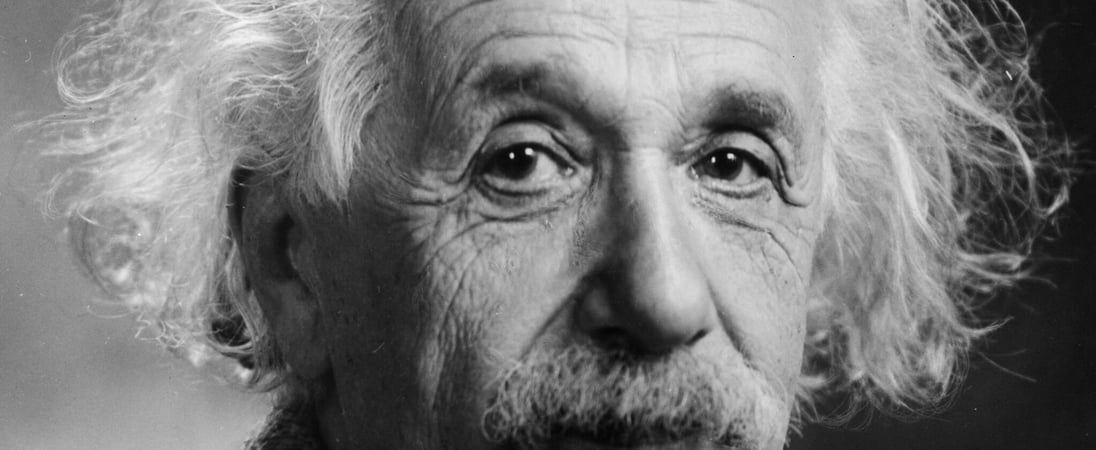
Albert Einstein's birthday
Albert Einstein, born in Germany on March 14, 1879, transformed how we understand the universe. He introduced the theory of relativity, a concept that revolutionized physics.
In 1921, his brilliant mind earned him the Nobel Prize in Physics, not for relativity but for his explanation of the photoelectric effect, showing how light can eject electrons from a material.
Einstein’s curiosity wasn’t confined to just science. He passionately advocated for peace and civil rights, making his voice heard on the global stage.
Beyond his iconic equation, E=mc^2, he contributed to developing quantum mechanics and studying the cosmos.
Einstein’s legacy is not just in his scientific achievements but also in his humanitarian efforts and his pursuit of knowledge. He inspired countless others to question, explore, and understand the world around them.
Albert Einstein’s Early Years
Albert Einstein’s childhood was marked by curiosity and questions. Born in the city of Ulm, Germany, he didn’t start talking until he was three.
Yet, this quiet boy was always thinking. At five, a compass fascinated him. He wondered what made the needle move. This early question marked the beginning of a lifelong journey into science.
Einstein faced challenges in school. Teachers often saw him as lazy because he daydreamed instead of paying attention. But he was just bored with the rote learning methods of the time. Albert loved books on science and math. He taught himself advanced subjects, showing a strong independence in learning.
At 16, he faced a big decision. Einstein left school in Germany and moved to Switzerland. There, he finished high school and entered the Swiss Federal Polytechnic School in Zurich to study physics and mathematics.
It was a bold step, but Albert was chasing his passion. This path was challenging, but it set the foundation for his future discoveries.
Einstein’s Path to Fame
Albert Einstein’s journey to success was as remarkable as his intellect. After graduating, he struggled to find a teaching job.
Instead, he landed a position at the Swiss Patent Office. Surprisingly, this job helped him focus on his theories. In his spare time, he delved into the mysteries of the universe.
In 1905, Einstein had his “miracle year.” He published four papers that changed physics forever. These included insights into the photoelectric effect, which later won him the Nobel Prize.
He also introduced the world to the equation E=mc^2, explaining the relationship between energy and mass. This work laid the groundwork for the development of nuclear energy.
Einstein’s theories of relativity reshaped our understanding of space, time, and gravity. His general theory of relativity, published in 1915, predicted phenomena like black holes and the bending of light by gravity. Scientists have since confirmed these predictions, solidifying his legacy.
Beyond science, Einstein had diverse interests. He loved music and played the violin throughout his life. He also became a public advocate for peace after witnessing the horrors of World War I. Later, he took a stand against the rise of fascism in Europe, eventually moving to the United States in 1933.
In his personal life, Einstein experienced ups and downs. He married Mileva Marić, a fellow physicist, in 1903.
They had three children but eventually divorced. In 1919, he remarried to his cousin Elsa. Despite his tumultuous personal life, Einstein continued to work on his scientific theories and social causes.
Einstein’s impact went beyond academia. He helped shape the modern world with his theories and inventions. Through his successes and challenges, Einstein remained committed to understanding the universe’s mysteries and advocating for a better world.
Interesting Facts About Albert Einstein
Refusal of the Presidency: Israel offered Einstein the position of President in 1952, but he declined, citing a lack of experience in dealing with people and political matters.
Passion for Civil Rights: He was an outspoken supporter of civil rights and a member of the NAACP. Einstein called racism “America’s worst disease.”
The Einstein Refrigerator: He co-invented a refrigerator that operated without electricity, aiming to improve living conditions in developing countries. The patent was granted in 1930.
Love for Music: He was an accomplished violinist. Einstein often stated that if he were not a scientist, he would be a musician.
Nobel Prize Misconception: Many assume he won the Nobel Prize for the theory of relativity. However, it was awarded for his explanation of the photoelectric effect.
FBI File: The FBI kept a file on Einstein, over 1,500 pages long, due to his political activism and affiliations with peace and anti-nuclear organizations.
Unique Brain Structure: After his death in 1955, Einstein’s brain was removed and studied. Researchers found that it had a higher number of glial cells in the region responsible for synthesizing information than the average brain.
Also on this date...
National Children’s Craft Day
Kids' creative hands, turning odds and ends into masterpieces, filling homes with colorful, quirky treasures that capture their boundless imagination.
White Day
A day when a gesture in return blooms, an opportunity to surprise and brighten, a chance to give back with a heartfelt touch.




